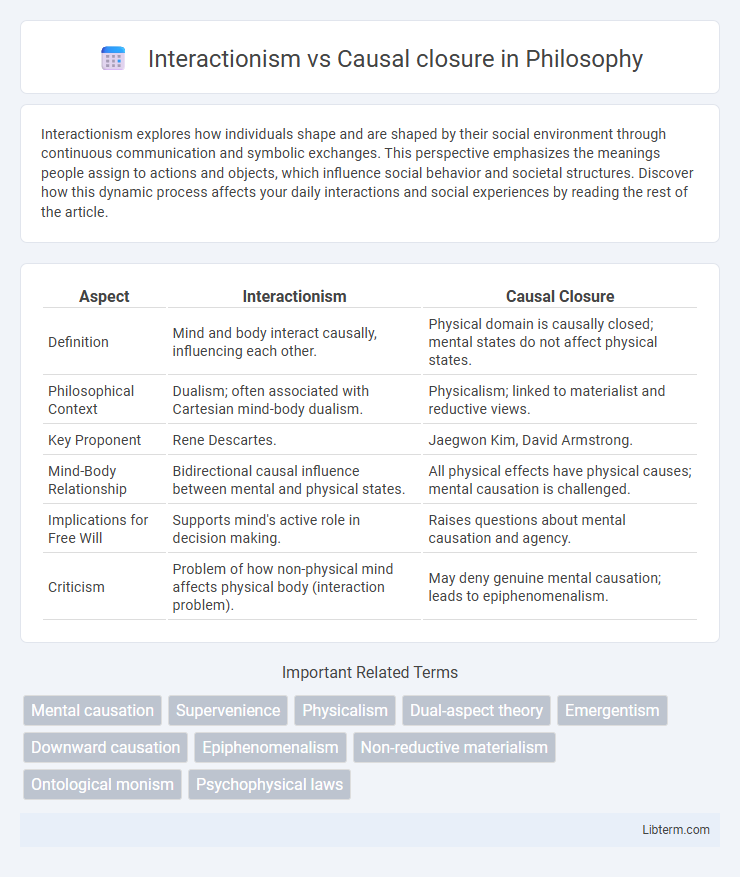Interactionism explores how individuals shape and are shaped by their social environment through continuous communication and symbolic exchanges. This perspective emphasizes the meanings people assign to actions and objects, which influence social behavior and societal structures. Discover how this dynamic process affects your daily interactions and social experiences by reading the rest of the article.
Table of Comparison
| Aspect | Interactionism | Causal Closure |
|---|---|---|
| Definition | Mind and body interact causally, influencing each other. | Physical domain is causally closed; mental states do not affect physical states. |
| Philosophical Context | Dualism; often associated with Cartesian mind-body dualism. | Physicalism; linked to materialist and reductive views. |
| Key Proponent | Rene Descartes. | Jaegwon Kim, David Armstrong. |
| Mind-Body Relationship | Bidirectional causal influence between mental and physical states. | All physical effects have physical causes; mental causation is challenged. |
| Implications for Free Will | Supports mind's active role in decision making. | Raises questions about mental causation and agency. |
| Criticism | Problem of how non-physical mind affects physical body (interaction problem). | May deny genuine mental causation; leads to epiphenomenalism. |
Introduction to Interactionism and Causal Closure
Interactionism posits that mind and body are distinct entities that causally influence each other, emphasizing a bidirectional relationship between mental states and physical processes. Causal closure of the physical domain asserts that every physical event has a sufficient physical cause, implying no non-physical causes can affect physical states. This foundational contrast shapes debates in philosophy of mind regarding the nature of consciousness and its relationship to the physical world.
Defining Interactionism: Mind and Matter
Interactionism posits that mind and matter are distinct substances that causally influence each other, asserting that mental states can affect physical states and vice versa. This dualistic approach challenges the principle of causal closure in physicalism, which claims that all physical effects have only physical causes. Defining interactionism centers on the dynamic interplay where mental phenomena are irreducible to physical processes yet actively participate in causal chains within the physical world.
The Principle of Causal Closure in Philosophy
The Principle of Causal Closure in philosophy asserts that every physical event has a sufficient physical cause, leaving no room for non-physical influences on physical processes. Interactionism, which claims that mental states can cause physical effects, challenges this principle by positing that mind and body interact causally. This tension highlights a core debate in the philosophy of mind regarding whether mental phenomena can have causal power within a closed physical system.
Historical Roots of the Debate
The historical roots of the interactionism versus causal closure debate trace back to early 17th-century Cartesian dualism, where mind and body were posited as distinct substances interacting through the pineal gland. This perspective confronted the rising mechanistic view of the 18th and 19th centuries, especially through Newtonian physics, which emphasized the causal closure of the physical domain, asserting that every physical effect has a sufficient physical cause. The tension intensified in the 20th century with the development of physicalism in philosophy of mind, challenging interactionism by claiming that mental phenomena are fully explainable by physical processes constrained by causal closure.
Key Arguments for Interactionism
Interactionism argues that mental states can causally influence physical states, challenging the causal closure of the physical domain which claims every physical event has a purely physical cause. Key arguments for interactionism emphasize the evident effects of beliefs and desires on bodily actions, supporting the mind's real causal efficacy. Proponents also highlight the explanatory power of interactionism in accounting for conscious experiences affecting behavior, which purely physicalist accounts struggle to accommodate.
Main Arguments Supporting Causal Closure
Causal closure argues that every physical event has a sufficient physical cause, supported by empirical evidence from physics indicating that natural laws govern all physical interactions without exceptions. This principle maintains that mental states cannot cause physical effects independently, reinforcing a deterministic and materialist view of the universe. Neurophysiological studies reveal brain activity consistently precedes conscious decisions, further bolstering causal closure against dualist interactionism.
Contemporary Perspectives and Critiques
Contemporary perspectives on Interactionism emphasize the persistent challenge of reconciling mental causation with physical causation under the framework of causal closure, which asserts that every physical event has a sufficient physical cause. Critics argue that Interactionism struggles to explain how non-physical mental states can exert causal influence without violating energy conservation or introducing dualistic inconsistencies. Emerging approaches seek to refine or abandon strict causal closure to accommodate mental causation, integrating insights from philosophy of mind, neuroscience, and physics.
Implications for the Mind-Body Problem
Interactionism proposes that mental states can causally affect physical states, challenging the principle of causal closure in the physical domain, which asserts that all physical effects have purely physical causes. This debate has profound implications for the mind-body problem by raising questions about whether consciousness can exert genuine causal influence or if it is epiphenomenal. Resolving this tension influences perspectives on mental causation, free will, and the explanatory scope of physicalism.
Related Theories and Alternative Views
Interactionism, rooted in Cartesian dualism, posits a bidirectional influence between mind and body, contrasting with causal closure, which asserts that physical events have only physical causes. Related theories include property dualism, suggesting mental properties arise from physical substrates but are irreducible, and epiphenomenalism, which views mental states as byproducts without causal efficacy. Alternative views like physicalism and emergentism propose that mental phenomena either fully reduce to physical processes or emerge from complex neural interactions without violating causal closure.
Conclusion: Evaluating the Debate
Interactionism posits that mental states can influence physical states, challenging the principle of causal closure, which asserts that all physical events have solely physical causes. Evaluating the debate reveals that interactionism struggles to reconcile with empirical evidence supporting causal closure in physics, yet it addresses the explanatory gap in consciousness better than strict physicalism. The conclusion underscores a persistent tension between maintaining scientific rigor and accounting for subjective mental causation.
Interactionism Infographic

 libterm.com
libterm.com